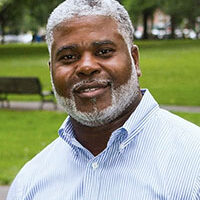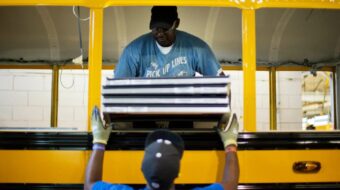
Sixty-five activists from New Haven, Conn., have been down in Georgia trying to turn out the vote for the two Democratic candidates in Tuesday’s U.S. Senate run-offs, elections that will decide which party controls the Senate for the next two years. They are among 900 canvassers there affiliated with the UNITE HERE union. New Haven Alder Ron Hurt is one of them, and reflects on his experiences here.
In Columbus, Georgia, many voters old and young have doubts about the power of their vote.
In conversations at their doorsteps, many have pointed out that a tree used for lynching still stands in the middle of the town, symbolizing their ongoing oppression. They argue that the consolidated government, which joins municipal and county powers, is controlled by a few powerful families. They cite a felony charge that a candidate, who challenged the incumbent district attorney, received for shooting a commercial with Black drivers who were spinning donuts in a vacant parking lot.
I understand this despair, and yet I know change is possible. I’m proud to be working with New Haven Rising and UNITE HERE to join the team of fighters like Stacey Abrams, Fair Fight, the New Georgia Project, and others who have been building power in Georgia for decades. Together, we are fighting to take back the Senate and grow a movement that will change politics in the South.
As the alder of the Third Ward of New Haven, and as someone who has struggled to make ends meet, I know the spiritual anguish of segregation. I know the pain of going to bed hungry, and I know the fear of being evicted. For generations, segregation has denied opportunities to so many people in my community and across our country. The legacy of racism saddles us with a heavy inertia, making us doubt the possibility of change, even under such dire and painful circumstances as ours today. History has taught us to lower our expectations for what life can be; it has taught us not to hope.
I challenged this history when I ran for alder, and I am challenging this history today as I mobilize voters for the runoff election in Georgia. The COVID-19 crisis threatens to further segregate our city and country, and I know that the fate of my community depends on what happens in Georgia this Tuesday. Every day, at every door, I carry my struggle in New Haven’s Hill neighborhood with me. This struggle allows me to bring voters in Georgia hope. The people in power most want us to give up on hope because hope inspires us to fight, and I know from experience that when we fight, we win the change we need.
In New Haven, the Board of Alders is committed to changing the map of segregated development. Every poor neighborhood in New Haven was marked hazardous or declining by redlining maps drawn in 1937. The map of home foreclosure rates after the Great Recession mirrors the COVID-19 infection rate map. These maps line up with a variety of other challenges, including unemployment, asthma, and shorter life expectancy. The Hill is one of the poorest neighborhoods in New Haven and experiences all of these challenges. For example, even before COVID-19 hit, 25% of the 30-year-olds who grew up in my ward were unemployed.
Changing this map requires focus from local elected leaders, investment from powerful institutions like Yale University and Yale New Haven Hospital, and a movement of residents who are building power for working families. But that’s not enough: changing the map also requires support from the federal government, especially after the COVID-19 crisis.
The relief bill that Congress just passed did not contain support for state and municipal governments, despite the fact that these governments have lost revenue and have been forced to provide many emergency services. Now, as our families face hunger and evictions, Mitch McConnell refuses to even allow a floor vote on providing working people with $2,000 of relief instead of just $600. He refuses to help us after four years of Republican attacks on workers’ rights, immigrants, the environment, and democracy itself.
Looking at this cruel reality, I understand why people lose hope. But I know change is possible: Georgia can make the difference.
That’s why I gave up Christmas with my family to live alone in a hotel room in Atlanta and canvass non-stop six days a week since Dec. 6. I am proud to be part of a canvassing operation organized by UNITE HERE that currently has over 900 people, primarily unemployed hospitality workers, canvassing to take back the Senate from the Republicans and the wealthy destructive interests that they represent.
Talking to voters in Georgia, I see that many people here face similar struggles against racism to those that we face in the Hill, and some challenges are even worse.
People are out of work. Others are working multiple jobs and still fighting to make ends meet. Voters here live under the shadow of Jim Crow and campaigns of racist terrorism that involved lynching and other horrific tactics. In school funding, Georgia spends about $9,000 less per pupil than we do in Connecticut. Gov. Kemp refused Medicaid expansion, which means people like parents of newborn babies face tragic choices of foregoing necessary medical care or building up years of medical debt.
Again, this reality would be enough to make anyone lose hope, but it doesn’t have to be this way. In both Georgia and the Hill, the first step to confronting our challenges is restoring hope and insisting on accountability. Voters in Columbus, Ga., remind me of voters in the Hill when I first ran for alder. They challenge me by asking why they should vote. They tell me that no matter what they do, nothing will ever change. They say that the system has been captured by powerful interests. They argue that they have always been cut out of opportunities, and they don’t believe that one vote is going to change that.
The current election is of historical consequence, but I know that I cannot convince voters by telling them that voting in one election is going to change everything. Instead, I share my story and the reasons that I became involved in politics. I tell them about the challenges of racism and segregation in the Hill, and my decision to make a long-term commitment to overcoming these challenges by organizing my community. I share how this commitment is rooted in my own history of confronting police violence against my family in the South. I urge them to hold their elected leaders accountable after they are elected. I also urge them to hold themselves and their neighbors accountable to building power and working with elected leaders who are trying to confront our nation’s history of segregation and racism.
I empathize with the difficulty of sustaining hope and commitment when injustice meets us at every turn. Still, I press them to consider the consequences of inaction. There is no easy path to freedom and no alternative to being in the fight for the long-haul.
A vote won
This message resonated with voters when I ran for alder in the Hill, and it resonates in Georgia now. One voter in Columbus stands out for me.
At his door, his mother told me that she was on her way to vote. When I asked about her son, she said that he was inside the house and that I could try to make him see things differently.
He came to the door steadfast in his resolution to stay home. He told me he didn’t care about politics and that elected leaders didn’t care about him. He argued that even if Rev. Raphael Warnock and Jon Ossoff win, his local government still wouldn’t be accountable to him or his community.
I asked him why he registered to vote if he didn’t want to follow through by going to the polls. I shared my story and told him how confronting the problems in my neighborhood inspired me to run for office. I told him that I look to my constituents as partners in building a movement because no elected leader will overcome the challenges we face alone.
After our conversation, he claimed his agency by joining his mother to vote.
Hard as the people in power make it for us to believe, we can change our lives, one conversation at a time. When I look to my community, to the people I meet on the doors, they give me all the hope I need. I know that, together, we will hold politicians accountable and change our lives.












Comments